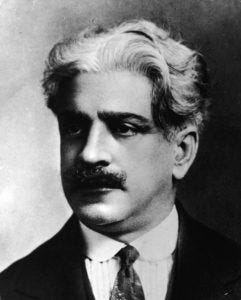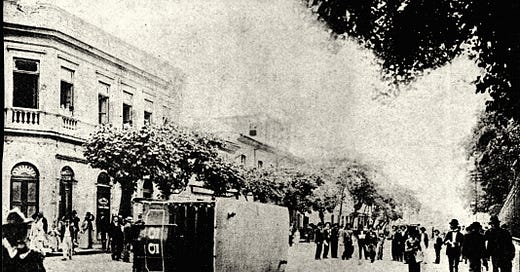Lessons from the Vaccine Revolt of 1904
How the fearmongering and rioting that almost ruined Rio de Janeiro’s smallpox vaccination campaign were averted.
Vaccines against COVID-19 may soon be available but controversies over wearing masks and social distancing—not to mention public resistance to other vaccines—have aroused concern that there may be widespread refusal to accept COVID-19 vaccination. Many parallels to our current challenges, and perhaps even a framework for overcoming resistance to COVID-19 vaccines, can be found in a largely forgotten episode from Brazilian history: the Vaccine Revolt of 1904.
Throughout the nineteenth century, Brazil suffered from recurrent epidemics of smallpox. Smallpox was a dreaded disease: It had a mortality rate of about 30 percent, it could be exceedingly painful, and it left many survivors scarred and disfigured. In 1904, smallpox afflicted about 7,000 people in Rio de Janeiro. To combat this epidemic, the Brazilian Congress passed a law mandating that the entire population be vaccinated. This law was an extension of a campaign by the president, Francisco de Paula Rodrigues Alves, to make Rio a more attractive destination for European immigration and investment, as well as a better place for its own citizens. Rodrigues Alves’s program entailed extensive reconstruction and beautification of downtown Rio and sanitary reforms to reduce the burden of infectious diseases in the city.

Oswaldo Cruz (1872 - 1917), Brazilian doctor who fought against yellow fever and bubonic plague in Brazil, advocated vaccination, and eradicated Yellow Fever from Rio de Janiero in 3 years, pictured circa 1915. (Hulton Archive / Getty)
The leader of Rodrigues Alves’s public health reforms was the director general of public health, Oswaldo Gonçalves Cruz. Cruz was a Brazilian physician who had studied at the Pasteur Institute in Paris and was familiar with the newest theories of infectious disease causation and transmission as well as with the use of vaccines and antisera for disease prevention and treatment. Only 32 years old, Cruz was already the leading expert on infectious diseases in Brazil and was widely admired for his work in combating yellow fever and plague.
In the evening of November 10, 1904, the day before the compulsory vaccination law was to take effect, a large anti-vaccine demonstration broke out in Rio. The organizers of the revolt, who objected to government intrusion into their lives, recruited others to join them. The press had frightened readers by referring to the law as the “Torture Code.” Men were urged to oppose vaccination because it was unmanly for them to allow public health workers to touch their wives and daughters. The next day, the protesters were joined by other groups who had other grievances and objectives, and the uprising became larger and more violent.
Many workers were angry because the government’s urban renovations had forced them to move from the center of Rio to outlying neighborhoods or to favelas on the outskirts of the city, and they were not provided with the new housing that the government had promised them or with the reliable and affordable public transportation they needed to get to their jobs. Some members of the military together with opposition politicians joined the protests in an effort to stage a coup. The revolt continued for about a week and almost succeeded in bringing down the government. Several dozen people were killed during the uprising and there was considerable destruction of property, especially property owned by the government and by companies involved in the urban renewal campaign. The revolt was finally ended on November 18, after the government suspended the compulsory vaccination law.
Once the vaccination law was revoked and the fearmongering stopped, opposition to vaccination decreased. Vaccination had been practiced in Brazil since the early nineteenth century and most people understood the value of the procedure. When the next smallpox epidemic struck, in 1908, there was little resistance to vaccination and smallpox started on the road to eradication.
Although Cruz had been the foremost advocate of compulsory vaccination, little anger was directed at him or at the Department of Public Health. People recognized that his efforts greatly reduced the incidence of smallpox and he remained a trusted authority who had the support and backing of the government. Today he is remembered for his many achievements in combating infectious diseases and is celebrated as the foremost public health worker in Brazilian history.
Making vaccination voluntary rather than compulsory was crucial to the fight against smallpox, but having respected leadership and consistent governmental support, together with credible evidence of the benefit of vaccination, were also essential to the success of this work. We have our Oswaldo Cruz in Anthony Fauci, and when COVID-19 vaccines are available their use will almost certainly be voluntary, but we will need trustworthy governmental oversight and convincing documentation of the safety and efficacy of these vaccines to ensure that people will accept vaccination and that we will be as successful in confronting the coronavirus pandemic as our forebears were in facing the menace of smallpox.




